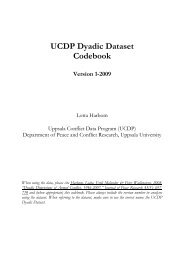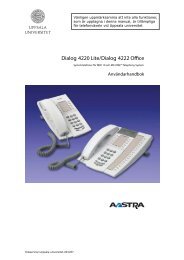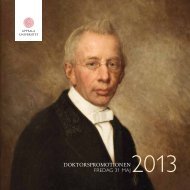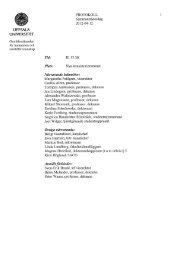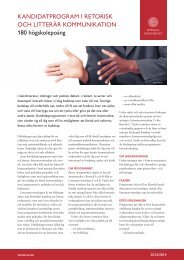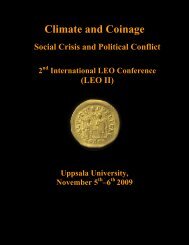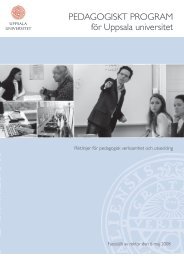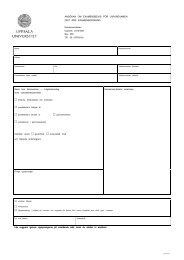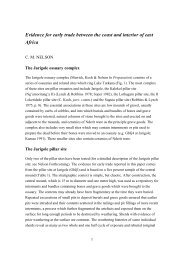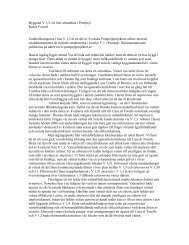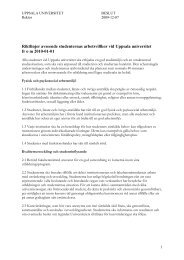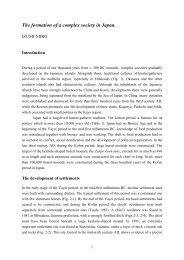Evaluation document, KoF11 Part A: Strategic aspects on research ...
Evaluation document, KoF11 Part A: Strategic aspects on research ...
Evaluation document, KoF11 Part A: Strategic aspects on research ...
Create successful ePaper yourself
Turn your PDF publications into a flip-book with our unique Google optimized e-Paper software.
Uppsala University 13<str<strong>on</strong>g>KoF11</str<strong>on</strong>g>[This paper examines the Uppsala model’s risk formulati<strong>on</strong> its two variables: commitment and uncertainty. Themain c<strong>on</strong>tributi<strong>on</strong> c<strong>on</strong>sits in the compositi<strong>on</strong> of a set of hypotheses <strong>on</strong> the effects of risk c<strong>on</strong>tingencies <strong>on</strong> afirm’s commitment behavior in different internati<strong>on</strong>alizati<strong>on</strong> phases]7. Hadjikhani, A. and Thilenius, P. (2009) Industrial relati<strong>on</strong>ships and the effects of different types ofc<strong>on</strong>necti<strong>on</strong>s, Industrial Marketing Management, Vol. 38, Number, 6, August/September, pp. 679-687.http://www.sciencedirect.com/science?_ob=ArticleURL&_udi=B6V69-4WT39V4-1&_user=651519&_coverDate=09%2F30%2F2009&_rdoc=16&_fmt=high&_orig=browse&_origin=browse&_z<strong>on</strong>e=rslt_list_item&_srch=docinfo(%23toc%235809%232009%23999619993%231399090%23FLA%23display%23Volume)&_cdi=5809&_sort=d&_docanchor=&_ct=17&_acct=C000035158&_versi<strong>on</strong>=1&_urlVersi<strong>on</strong>=0&_userid=651519&md5=49e1e4fad7685b00fcdad1704711d981&searchtype=a[The paper presents a study of business relati<strong>on</strong>ships c<strong>on</strong>necti<strong>on</strong>s to different types of actors. It statisticallyexamines how different types of business, competitors, socio-political c<strong>on</strong>necti<strong>on</strong>s impact <strong>on</strong> the core business.]8. Hadjikhani, A., Lee, J-W. and Ghauri, P. N. (2008) Network view of MNCs' socio-politicalbehaviour, Journal of Business Research, 61, pp. 912–924.http://www.sciencedirect.com/science?_ob=ArticleURL&_udi=B6V7S-4R70BSP-1&_user=651519&_coverDate=09%2F30%2F2008&_rdoc=5&_fmt=high&_orig=browse&_origin=browse&_z<strong>on</strong>e=rslt_list_item&_srch=docinfo(%23toc%235850%232008%23999389990%23691721%23FLA%23display%23Volume)&_cdi=5850&_sort=d&_docanchor=&_ct=17&_acct=C000035158&_versi<strong>on</strong>=1&_urlVersi<strong>on</strong>=0&_userid=651519&md5=f2d4523f78ee751ec0a4667bae8943b9&searchtype=a[The paper examines the impact of socio-political relati<strong>on</strong>ships <strong>on</strong> MNCs entry and expansi<strong>on</strong>. The two casestudies of Swedish and South-Korean MNCs in Europe are compared.]9. Havila, Virpi and Asta Salmi, 2009, Managing Project Ending, L<strong>on</strong>d<strong>on</strong>: Routledge.[The existing studies mainly c<strong>on</strong>cern the initiati<strong>on</strong> and development of projects. This book c<strong>on</strong>cerns c<strong>on</strong>trary toexisting studies elaborate thoughts <strong>on</strong> ending and terminati<strong>on</strong> of projects and the c<strong>on</strong>sequences.]10. J<strong>on</strong>ss<strong>on</strong>, S., Greve, H. and Fujiwara-Greve, T., 2009, “Undeserved Loss: the Spread of LegitimacyLoss to Innocent Organizati<strong>on</strong>s in Resp<strong>on</strong>se to Reported Corporate Deviance”, Administrative ScienceQuarterly, 54: 2, pp. 195-228.http://search.ebscohost.com/login.aspx?direct=true&db=ehh&bquery=(JN+%22Administrative+Science+Quarterly%22+AND+DT+20090601)&type=0&site=ehost-live[This paper formulates and tests an organisati<strong>on</strong> level theory for undeserved loss of reputati<strong>on</strong>. A key mechanismis the rough categorizati<strong>on</strong> of organizati<strong>on</strong>s comm<strong>on</strong>ly applied in society, which leads to generalizati<strong>on</strong> of badorganizati<strong>on</strong>al behaviour also across undeserving organizati<strong>on</strong>s. The theory is tested in the c<strong>on</strong>text of theSkandia scandal and the Swedish pensi<strong>on</strong> system.]11. Levay, C. and Waks, C., 2009, “Professi<strong>on</strong>s and the Pursuit of Transparency: Two Cases of SoftAut<strong>on</strong>omy”, Organizati<strong>on</strong> Studies, 30: 5, pp. 509-527.http://oss.sagepub.com/c<strong>on</strong>tent/30/5/509.full.pdf+html[This paper analyses two cases in Swedish healthcare where professi<strong>on</strong>al groups got actively engaged invisualising professi<strong>on</strong>al work. The fallout is characterised as a ‘soft professi<strong>on</strong>al aut<strong>on</strong>omy’ – professi<strong>on</strong>alsinternalised auditing ideas but remained in c<strong>on</strong>trol of crucial evaluati<strong>on</strong> criteria and procedures.]2011-02-28 Dept of Business Studies v 1.0



